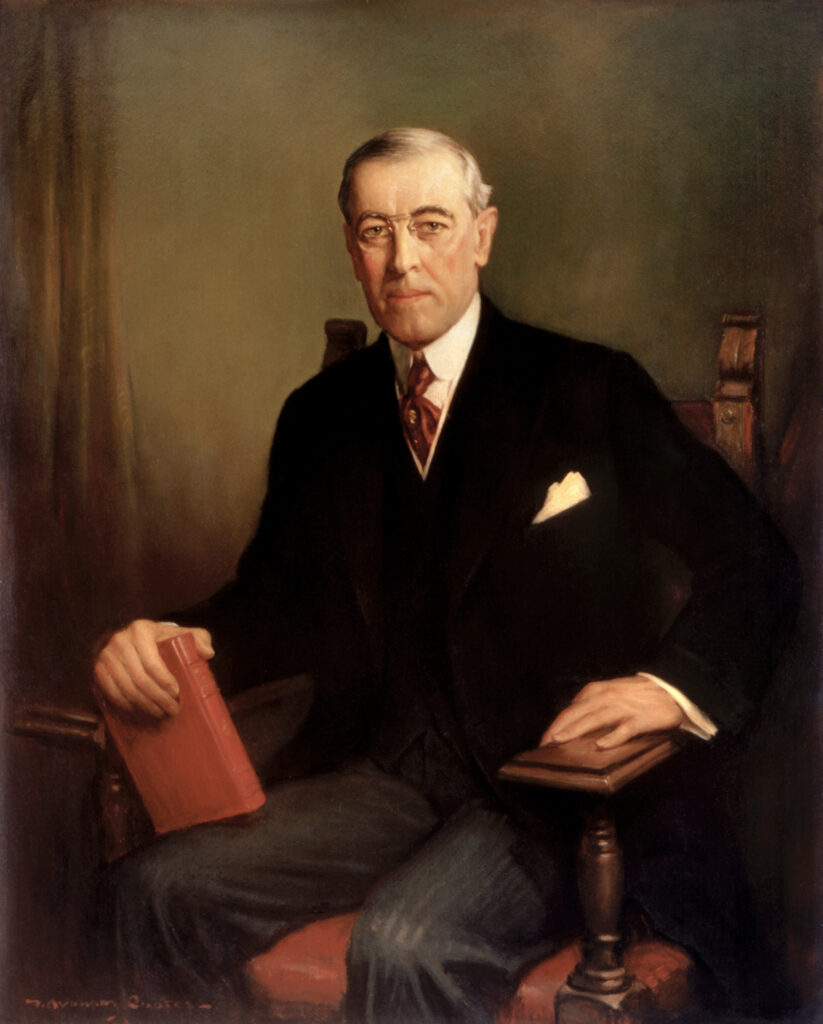Wilsonian Humanitairianism

Credit: Frank Graham Cootes
Licence: Frank Graham Cootes, Public domain, via Wikimedia Commons
1913
| Giver: | Government |
|---|---|
| Receiver: | Registered Organization |
| Gift: | Other |
| Approach: | Other |
| Issues: | 10. Reduced Inequalities |
| Included in: | Humanitarianism & Philanthropy |
Wilsonian humanitarianism is a form of humanitarian assistance rooted in ideals of representative democracy, free trade and multilateral cooperation. Wilsonianism initially referred to US President Woodrow Wilson geo-political to the First World War and his Fourteen Points plan following the Treaty of Versailles. Wilson’s vision resulted in the creation of the League of Nations, the precursor to the United Nations (U.N.) and has continued to shape U.S. foreign policy into the twenty-first century. In the sphere of NGO activity, Wilsonian humanitarianism tries to support and reinforce democratic principles worldwide. The Wilsonian model frequently coordinates its efforts with local governments.
Democratically elected government, regulated capitalism, collective security and American leadership are the four principles at the core of Wilsonianism. Wilson was convinced that political systems based on freedom and equality are inherently more peaceful than authoritarian models. In a democracy, opposing factions attempt to resolve differences through compromise and consensus. By contrast, authoritarian regimes enforce policies unilaterally, often through coercion and violence. In his address to the U.S. Congress on April 2, 1917, Wilson declared: “Only free peoples can hold their purpose and their honor steady to a common end, and prefer the interests of mankind to any narrow interest of their own.”
This notion of collective interest underpins the second principle of Wilsonian humanitarianism. Wilson believed that capitalism, when tightly controlled, had the potential to cultivate economic integration and cooperation between nations. By promoting shared prosperity, free trade offered a crucial protection against global conflict.
The establishment of a lasting peace also depended on the strength of international institutions. In the last of his Fourteen Points, Wilson called for the establishment of a “general association of nations” to safeguard “mutual guarantees of political independence and territorial integrity to great and small states alike.” Wilson further believed that U.S. involvement in such an association was necessary to insure that member states would uphold democratic principles. Wilson’s proposal led to the formation of the League of Nations in 1920.
Wilsonianism helped drive Europe’s recovery following World War II, bolstering democratic institutions while promoting economic interdependence. This spirit of cooperation laid the foundation for the European Union and later influenced the reshaping of Eastern Europe following the collapse of the Soviet Bloc. In other parts of the world, Wilsonian humanitarian efforts have helped strengthen free societies and modernize economies.
Wilsonian humanitarianism has sparked criticism over the years. Some opponents have argued that the philosophy provides an ideological shield for American military aggression overseas, supports a neoliberal capitalist agenda and undermines local sovereignty while thwarting economic justice.
Despite its shortcomings, Wilsonian humanitarianism remains committed to its original ideals: supporting representative democracies throughout the world, it empowers governments to align foreign aid programs with the desires and needs of the people. In this respect, Wilsonian humanitarianism continues to offer a blueprint for peace and social justice in the era of globalization.
Contributors: Maha Tazi, Stephen Meyer
| Source type | Full citation | Link (DOI or URL) |
|---|---|---|
| Publication |
Cotton, James. “A century of Wilsonianism: a review essay.” Australian Journal of Political Science 53.3 (2018): 398–407. |
- |
| Book |
Hövelmann, Sonja. Triple Nexus to Go: Humanitarian Topics Explained. Berlin: Centre for Humanitarian Action, 2020 |
- |
| Publication |
Lie, Jon Harald Sande. “The Humanitarian-Development Nexus: Humanitarian Principles, Practice, and Pragmatics”. Journal of International Humanitarian Action 5 no. 1 (2020): 18. |
https://doi.org/10.1186/s41018-020-00086-0. |
| Publication |
Rose, Joanne, Phil O’Keefe, Janaka Jayawickrama, and Geoff O’Brien. “The Challenge of Humanitarian Aid: An Overview”. Environmental Hazards 12 no. 1 (2013): 74–92. |
https://doi.org/10.1080/17477891.2012.742368. |
| Book |
Anderson, Uwe, and Katharina Behmer. “The Governance of Humanitarian Action in World Politics”. In International Humanitarian Action. Springer International Publishing AG, 2018. |
- |